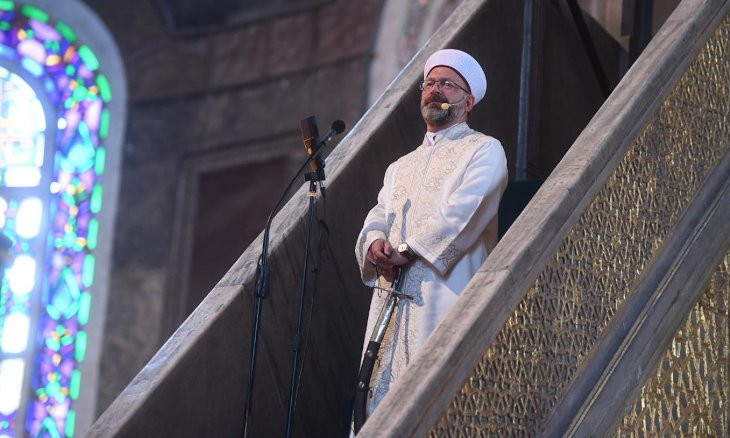Russian Orthodox Church slams Turkey for 'disrespecting Christian monuments'
Turkey shows disregard towards Byzantine and Christian cultural heritage and fails to fulfil its promise to maintain free access to Hagia Sophia, Nikolay Balashov, an archpriest of the Russian Orthodox Church, said, addressing Ankara's latest decision to convert the historic Chora church into a mosque. The archpriest added that Patriarch Bartholomew of Constantinople has fully lost influence "at home."
Duvar English
The Russian Orthodox Church has slammed Turkey for converting the historic Chora church, one of Istanbul's most celebrated Byzantine buildings, into a mosque.
Nikolay Balashov, an archpriest of the Russian Orthodox Church, said that Ankara shows disregard towards Byzantine and Christian cultural heritage and fails to fulfil its promise to maintain free access to Hagia Sophia.
"It seems that the Turkish leaders are ready to continue to consistently ignore the global value of the heritage of conquered Byzantium, which they do not understand, and to openly demonstrate a contemptuous indifference to Christian cultural values," Balashov told Sputnik on Aug. 21, adding that Ankara's approach does not contribute to peace and mutual respect between followers of different religions.
The archpriest also said that although Turkish President Recep Tayyip Erdoğan promised to maintain free access to Hagia Sophia's Christian relics, mosaics and frescoes, they are constantly covered.
 Turkey's top religious body head defends delivering sermon with a sword during prayers at Hagia Sophia
Turkey's top religious body head defends delivering sermon with a sword during prayers at Hagia SophiaBalashov added that women have limited access to the site of the former church, and main cultural relics are not visible to them.
He suggested that the same fate awaits the Chora Church, where many valuable Byzantine-era mosaics and frescoes are being kept. The archpriest added that Patriarch Bartholomew of Constantinople has fully lost influence "at home."
The mediaeval Church of the Holy Saviour in Chora, built near the ancient city walls of Constantinople, contains 14th century Byzantine mosaics and frescoes showing scenes from biblical stories.
They were plastered over after the city was conquered by the Muslim Ottomans in 1453, but brought to light again when - like Hagia Sophia - the building was converted to a museum by Turkey more than 70 years ago.
Last year a Turkish court annulled a 1945 government decision converting Chora - known as Kariye in Turkish - into a museum run by the Education Ministry.
 Pro-Taliban group records video at Hagia Sophia
Pro-Taliban group records video at Hagia SophiaOn Aug. 21, an edict signed by President Recep Tayyip Erdoğan and published in Turkey's official gazette declared "the management of the Kariye Mosque be transferred to the Religious Affairs Directorate, and [the mosque] opened to worship."
A church was first built at the site in the 4th century, but most of the existing building dates to an 11th century church that was partly rebuilt 200 years later following an earthquake.
Erdoğan's edict on Aug. 21 did not say when the first Muslim prayers would be held at Chora, or what arrangements would be made for the Christian artworks there.
At Hagia Sophia, curtains have been drawn in front of an image facing worshippers of Mary and the infant Jesus.
